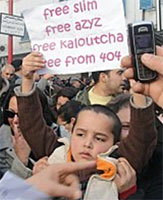UNESCO invited all journalists and media development partners to celebrate World Press Freedom Day 2011 in Tunis
05-05-2011 (Tunisia)

Photo of protests from Facebook
This year’s celebration of World Press Freedom Day for North Africa took place on 3 May at the Cultural Centre El Menzah in Tunis under the theme “21st century’s media for building democracy”. The celebration brought together a wide range of local media partners, national broadcasters, bloggers and cyber activists, representatives from the transitional government and the committees on media reforms, United Nations and bilateral cooperation agencies.
This year, which marks the twentieth anniversary of the establishment of World Press Freedom Day, Tunisian media have witnessed an abrupt change from a totally centralized media system and an oppressive censorship to the full enjoyment of freedom of information and expression. Despite the draconian control and filtering mechanism exercised by the Tunisian Internet Agency, nearly 2 million people in Tunisia (about one fifth of the population) had Facebook accounts, and Internet had about 50 per cent penetration, the highest percentage in the Arab World. The extensive use of social media by a group of young Internet users and bloggers who reported abuses involving the security personnel and exposed government’s wrong-doings during the January 2011 protests prompted some commentators to describe the events as a "Facebook victory" and a "Twitter revolution.”
In this context, the celebration of World Press Freedom Day in Tunis provided a platform to reflect on the challenges and opportunities offered by new media and new forms of expression online (Facebook, Twitter, blogs, etc.) for the reconstruction process and further enhancement of democracy. Participants also discussed the necessary legal frameworks to guarantee safety of journalists and bloggers, and to protect freedom of expression in the digital communication era.
World Press Freedom Day is celebrated every year all over the world to recall fundamental principles of freedom of expression and to honour journalists who have lost their lives in the exercise of their profession. Particular attention was paid to the French photographer Lucas Mebrouk Dolega, who died from injuries sustained while covering demonstrations on 17 January in Tunisia.
The celebration was organized in partnership with the National Syndicate of Tunisian Journalists, United Nations organizations in Tunisia and the Tunisian National Commission for UNESCO. All journalists and media development partners for Tunisia were invited to participate in the event, which was also attended by personalities such as Ignacio Ramonet, President of the Spanish Monde Diplomatique and author of the recently published book “Explosion of journalism. From mass media to the media mass”, as well as by several international experts and researchers on the Arab States cyber-revolution.
In this context, the celebration of World Press Freedom Day in Tunis provided a platform to reflect on the challenges and opportunities offered by new media and new forms of expression online (Facebook, Twitter, blogs, etc.) for the reconstruction process and further enhancement of democracy. Participants also discussed the necessary legal frameworks to guarantee safety of journalists and bloggers, and to protect freedom of expression in the digital communication era.
World Press Freedom Day is celebrated every year all over the world to recall fundamental principles of freedom of expression and to honour journalists who have lost their lives in the exercise of their profession. Particular attention was paid to the French photographer Lucas Mebrouk Dolega, who died from injuries sustained while covering demonstrations on 17 January in Tunisia.
The celebration was organized in partnership with the National Syndicate of Tunisian Journalists, United Nations organizations in Tunisia and the Tunisian National Commission for UNESCO. All journalists and media development partners for Tunisia were invited to participate in the event, which was also attended by personalities such as Ignacio Ramonet, President of the Spanish Monde Diplomatique and author of the recently published book “Explosion of journalism. From mass media to the media mass”, as well as by several international experts and researchers on the Arab States cyber-revolution.
Related themes/countries
· Arab States
· Tunisia
· Weekly newsletter
· UNESCO/Guillermo Cano World Press Freedom Prize 2011
· World Press Freedom Day 2011
Share this story:
Contact information
- UNESCO
Source














